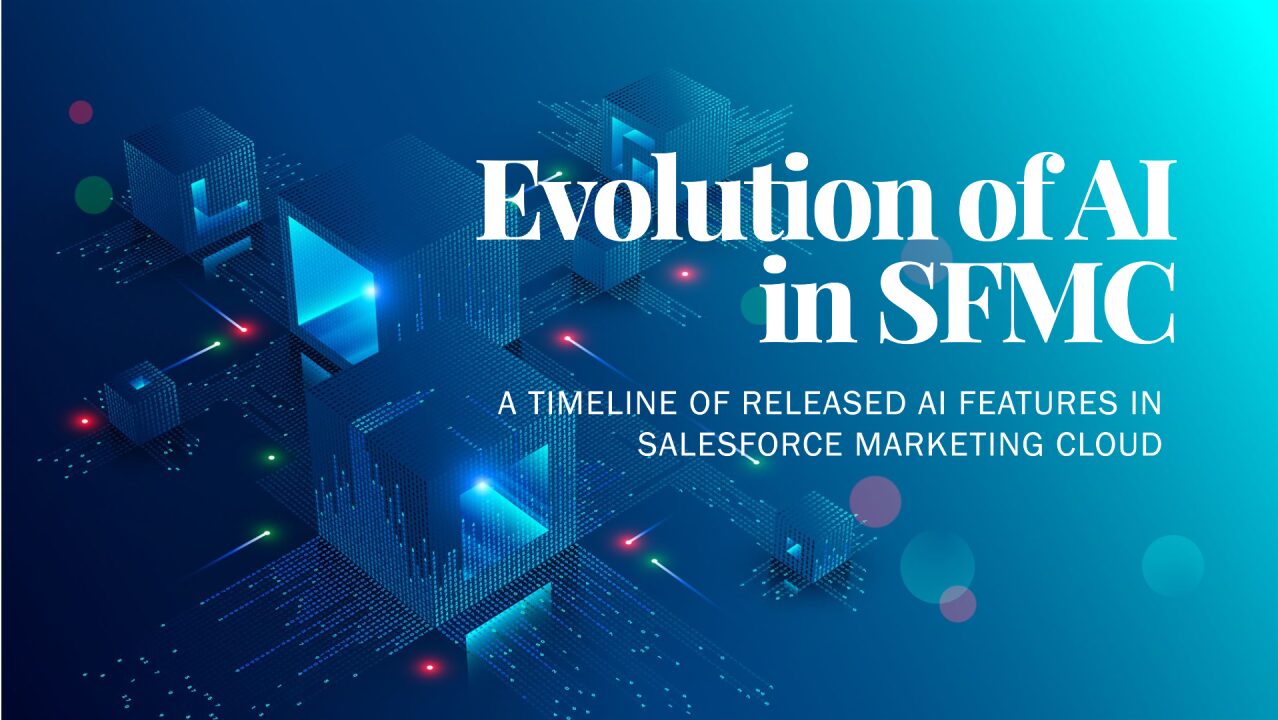
Salesforce has been integrating artificial intelligence (AI) into its Marketing Cloud since 2016, aiming to enhance customer engagement through predictive analytics, automation, and smarter content delivery. Over the years, Einstein, Salesforce’s AI-powered suite, has evolved within the Marketing Cloud platform to provide deeper insights, personalization, and automation.
2016: The Dawn of Einstein in Marketing Cloud
The introduction of Einstein in 2016 marked the beginning of a new era for Salesforce Marketing Cloud. Key features included:
- Einstein Journey Insights: Offered performance analytics for customer journeys, helping marketers optimize engagement paths.
- Einstein Predictive Scoring: Predicted the likelihood of customer engagement, enabling marketers to focus on high-value leads.
- Einstein Engagement Frequency: Recommended the optimal frequency of communications to avoid customer fatigue.
- Einstein Content Tagging: Automatically tagged content assets using natural language processing (NLP), simplifying content management.
These features aimed to automate repetitive tasks, provide actionable insights, and enhance the personalization of marketing efforts.
2017: Expanding AI’s Role in Personalization
In 2017, Salesforce expanded Einstein’s AI capabilities, focusing on delivering more advanced insights and personalization:
- Einstein Engagement Scoring: Predicted how customers would interact with email campaigns, helping marketers optimize their messaging.
- Einstein Messaging Insights: Flagged anomalies in campaign performance, enabling marketers to adjust strategies in real-time.
- Einstein Content Selection: Provided personalized content recommendations based on customer behavior.
- Einstein Social Insights: Analyzed social media data to refine marketing strategies.
These innovations gave marketers the tools to personalize at scale and act quickly to optimize their campaigns.
2019: Smarter Predictions and Enhanced Personalization
In 2019, Salesforce built upon its AI capabilities by introducing features that allowed for even more sophisticated personalization and campaign optimization:
- Einstein Send Time Optimization (STO): Predicted the best times to send emails, improving open rates.
- Einstein Cross-Channel Insights: Provided insights into customer behavior across email, SMS, push notifications, and more.
- Einstein Audience Segmentation: Automated audience segmentation based on predicted behaviors, making it easier to create targeted campaigns.
- Einstein for Mobile: Enhanced personalization for mobile push notifications and in-app messages.
This year marked a significant leap in AI’s ability to deliver cross-channel insights, enhance mobile marketing, and streamline audience targeting.
2020: Adapting to a New Normal
In response to the changing landscape due to the COVID-19 pandemic, Salesforce introduced AI features to help marketers stay agile in a digital-first world:
- Einstein for Interaction Studio: Real-time personalization using AI for web, mobile, and digital channels.
- Einstein Engagement Frequency (Enhanced): Provided more granular recommendations on how often to contact customers.
- Einstein for Distributed Marketing: Allowed local teams to use AI-driven content while maintaining brand consistency.
- Einstein Content Testing: Enabled AI-powered A/B testing for email and mobile campaigns.
These enhancements helped marketers optimize their campaigns for increased relevance and engagement in a rapidly changing environment.
2021: Enhanced AI for Real-Time Personalization
Salesforce’s AI innovations in 2021 further deepened personalization and cross-channel integration:
- Einstein for CDP (Customer Data Platform): AI-powered audience segmentation and predictions based on customer data.
- Einstein Engagement Scoring Enhancements: Expanded predictive scoring across various channels, including email, SMS, and social media.
- Einstein Interaction Scoring: Predicted engagement likelihood based on real-time and historical customer behavior.
- Einstein Ethical AI Enhancements: Tools to ensure AI-driven marketing adhered to ethical guidelines and reduced bias.
These features aimed to offer marketers deeper insights and more precise recommendations for engagement, helping to connect customer data across different touchpoints.
2022: Real-Time Insights and Privacy-First AI
In 2022, Salesforce continued to focus on real-time engagement and ethical AI use:
- Einstein for Real-Time CDP: AI-driven segmentation and predictions based on streaming customer data.
- Einstein for NFT Management: Personalized recommendations for NFT-related campaigns.
- Einstein Personalization for Commerce Cloud: Integrated with Commerce Cloud to deliver personalized product recommendations across marketing channels.
- Einstein for Privacy and Compliance: Tools to help marketers ensure compliance with privacy laws like GDPR and CCPA.
These innovations enhanced the platform’s ability to provide real-time, personalized experiences while ensuring ethical AI usage.
2023: Enter Generative AI and Chatbots
In 2023, Salesforce introduced Einstein GPT, a generative AI tool designed to help marketers create personalized content and customer interactions. Key updates included:
- Einstein Copilot: An AI assistant that provides real-time recommendations and insights, helping marketers make informed decisions quickly.
- Generative AI Enhancements: Features like subject line and body copy suggestions, helping marketers create compelling email content faster.
- WhatsApp Integration: AI-powered personalization for messaging on WhatsApp, a globally popular communication platform.
These updates showcase Salesforce’s investment in generative AI and the integration of new messaging channels to enhance customer engagement.
2024: Accelerating Personalization and Campaign Efficiency
In 2024, Salesforce launched Einstein Copilot for Marketers, an AI-powered assistant designed to streamline campaign content creation and management. Additionally, Einstein Personalization was upgraded to leverage Salesforce Data Cloud, delivering more accurate and timely personalized recommendations based on customer behavior across various touchpoints.
Looking Ahead: The Future of AI in Salesforce Marketing Cloud
Salesforce’s future plans for AI within Marketing Cloud are focused on deepening personalization, enhancing decision-making, and improving cross-cloud integration. Key initiatives include:
- Integration with Data Cloud and Salesforce Flow: Enhanced customer experiences through advanced data graphs and automated marketing orchestration.
- AI-Driven Automation: The use of AI for smarter, more efficient decision-making across all customer touchpoints.
- Ethical AI: A continued focus on responsible AI practices, ensuring fairness, transparency, and privacy in marketing strategies.
As AI evolves, Salesforce continues to push the boundaries of what’s possible, enabling marketers to deliver highly personalized, data-driven experiences at scale. The future of Salesforce Marketing Cloud is shaped by deeper AI integration, creating smarter, more seamless marketing solutions that drive customer success.
Further Reading
Salesforce New Data and AI Enhancements for Retail
The Future of Marketing Cloud Journey Builder: Flow Engine and More

Leave a Reply